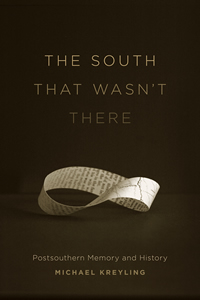What's Left of Memory
In a new book of criticism, Michael Kreyling challenges perceptions of Southern identity
What is the South, and who owns its memory? The question of Southern identity is hardly new, and yet it persists in provoking considerable and often uncivil argument. At the core of the debate, renewed in Michael Kreyling’s The South That Wasn’t There: Postsouthern Memory and History, is the conflict between an idealized cultural “memory” of the South as it appears in the iconic Gone With the Wind, and the grim, brutal realities of Southern history that both figuratively and literally haunt the characters of Toni Morrison’s 1987 masterpiece, Beloved. In one, Southern history is defined by faith and family, honor and chivalry; in the other, a privileged few gain their leisure on the backs of the slaves whose bondage was all too frequently compounded by even more hideous atrocities.
It would seem impossible for white Southerners in the twenty-first century to cling to a vision of the past that omits our greatest shame. Yet in April 2010, Bob McDonnell, the recently elected Republican governor of Virginia, drew fire from all sides after issuing a Confederate History Month proclamation that omitted any reference to slavery as a cause or condition leading to Virginia’s secession from the United States in 1861. Though McDonnell eventually admitted that the omission of slavery in his proclamation was a “mistake,” his initial defense of the statement’s language claimed that slavery’s horrors and the critical role it played in leading Virginia into a conflict that turned the state into what writer and Virginia native Bob Shacochis has called “the abattoir of the South” were not “significant” enough to merit mention alongside the “sacrifices” of those who took up the cause of the Confederacy.
 McDonnell’s willful omission fits tidily into the thesis of The South That Wasn’t There. For Michael Kreyling, the conflict between history (the way things were) and memory (the way we remember them, either by choice or circumstance) is what shapes our understanding of Southern identity. “Who we are,” Kreyling writes, “depends on what we remember.”
McDonnell’s willful omission fits tidily into the thesis of The South That Wasn’t There. For Michael Kreyling, the conflict between history (the way things were) and memory (the way we remember them, either by choice or circumstance) is what shapes our understanding of Southern identity. “Who we are,” Kreyling writes, “depends on what we remember.”
In The South That Wasn’t There, Kreyling, an English professor at Vanderbilt and co-editor (with novelist Richard Ford) of the Library of America’s Eudora Welty anthologies, exploits the tension between history and memory throughout a variety of literary texts, both high and low. His examples range from Nobel Laureate Morrison’s Beloved to science-fiction/fantasy author Harry Turtledove’s “alternate history” novel, The Guns of the South (1992), in which time-traveling white supremacists from the future deliver a supply of AK-47 submachine guns to Robert E. Lee’s Army of Northern Virginia. In each chapter, Kreyling cleverly and provocatively prods at the unconscious biases and learned sensibilities that make the argument over ownership of Southern identity so embattled and potentially explosive.
The South That Wasn’t There is primarily a work of scholarship, not one of popular cultural studies, and making sense of it requires familiarity with both major and recent scholarly texts and theories. In fact, Kreyling opens the book with his most challenging chapter: an attempt, using Morrison’s Beloved, to draw connections between the history and memory of the Holocaust and that of slavery.
The book’s unorthodox and provocative arguments may be interesting to lay readers, nonetheless. In his analysis of Robert Penn Warren’s transition from Agrarian segregationist to staunch integrationist, for example, Kreyling dismantles Warren’s reconstructed identity as a noble civil-rights activist, noting that Warren, the Vanderbilt English Department’s most distinguished alum, never acknowledged a rival in W.E.B. DuBois, who graduated from Nashville’s Fisk University and was the nation’s most prominent black intellectual when Warren was working on “The Briar Patch,” his contribution to the controversial Agrarian manifesto, I’ll Take My Stand, a collection that also includes essays by Warren’s mentors at Vanderbilt: John Crowe Ransom, Allen Tate, and Andrew Lytle. “Our attention should be focused,” Kreyling argues, “on what Warren chooses to forget (the presence of DuBois), not what he might like us to remember (that many southerners were more racist than the young author of ‘The Briar Patch’).” Kreyling’s critique of Warren and his legacy might be called a posthumous character assassination were it not so challenging a reminder of the difference between the way we’d like to be seen and the way we are.
 Kreyling is most engaging in his discussion of the warrior mythos in Southern culture—the “collective memory of the South as an honor-bound culture” which both required and celebrated “otherwise destructive acts,” as he puts it. After analyzing how this myth was undercut by the myth of the Vietnam soldier as a “crazed, psychotic killer,” Kreyling argues that public opinion of recent foreign wars has been largely shaped by a collective desire to reconstruct the original image of the honor-bound warrior derived from a dubious memory of the Civil War soldier: “If there was a crisis in national manhood, as well as in Vietnam memory, in the early 1990s, revisiting the Civil War can be seen as both symptom and treatment,” he writes. “Ken Burns’s highly rated PBS documentary The Civil War, like Michael Shaara’s The Killer Angels fifteen years earlier, reframed the 1861-1865 war in the public mind, complete with musical soundtrack, voiceover, hundreds of still images, and the charismatic presence of novelist-historian Shelby Foote—a living connection by way of accent and rhetoric to the heroic age The Civil War conjures.” Just as George H.W. Bush launched Operation Desert Storm, “U.S. public memory got a refreshed version of just and noble war, and with a heavy southern accent.”
Kreyling is most engaging in his discussion of the warrior mythos in Southern culture—the “collective memory of the South as an honor-bound culture” which both required and celebrated “otherwise destructive acts,” as he puts it. After analyzing how this myth was undercut by the myth of the Vietnam soldier as a “crazed, psychotic killer,” Kreyling argues that public opinion of recent foreign wars has been largely shaped by a collective desire to reconstruct the original image of the honor-bound warrior derived from a dubious memory of the Civil War soldier: “If there was a crisis in national manhood, as well as in Vietnam memory, in the early 1990s, revisiting the Civil War can be seen as both symptom and treatment,” he writes. “Ken Burns’s highly rated PBS documentary The Civil War, like Michael Shaara’s The Killer Angels fifteen years earlier, reframed the 1861-1865 war in the public mind, complete with musical soundtrack, voiceover, hundreds of still images, and the charismatic presence of novelist-historian Shelby Foote—a living connection by way of accent and rhetoric to the heroic age The Civil War conjures.” Just as George H.W. Bush launched Operation Desert Storm, “U.S. public memory got a refreshed version of just and noble war, and with a heavy southern accent.”
In The South That Wasn’t There, the center does not always hold. Occasionally Kreyling’s arguments become mired in the complex diction of academic discourse, and his thesis can at times seem tenuously connected to the texts he’s chosen for analysis. Nevertheless, his insights throughout are illuminating and stimulating. He gives a lively defense of The Wind Done Gone (2001) by his Vanderbilt colleague, Alice Randall, whose parody of Gone with the Wind inspired a legal battle with the Margaret Mitchell estate. “Randall’s complex point,” Kreyling suggests, “is that without Gone With the Wind’s omissions and willful naïveté, the myth of the plantation South would never have survived in cultural memory; its survival constitutes a silencing of other memories; and that the readings of Gone With the Wind clueless to these evasions need to be smartened up.”
These memory-history clashes appear in everything from canonical and iconic texts to sci-fi fantasy pulp novels and on into the daily news cycle. Harry Turtledove’s alternate-history fantasy novel, The Guns of the South, imagines a post-war history in which Robert E. Lee wins the war, thanks to machine guns provided by time-traveling white supremacists, and becomes President of the Confederacy. Discovering—and rejecting—the time travelers’ white-supremacy plot, Lee then oversees a benevolent, gradual emancipation of slaves. Turtledove’s narrative, writes Kreyling, proves that “it is possible to remember the South and Southern identity without, in the same act, expressing even covertly a preference for white superiority.”
This desire to cling to an idealized image of the Old South without having to account for or reconcile the nasty little problems of slavery and racism is, of course, what so glaringly reappeared so recently in the words and deeds of influential public figures like Bob McDonnell. As recently as November 29, The New York Times reported that, with the 150th anniversary of the Civil War looming, some Southerners are already seizing the moment to reframe the history of the conflict in a light more favorable to their ancestors, with “Secession Balls,” parades, and celebratory television commercials. “We in the South, who have been kicked around for an awfully long time and are accused of being racist, we would just like the truth to be known,” said a spokesman for the Sons of Confederate Veterans. Clearly, The South That Wasn’t There has as much to tell us about the present as it does about the past.


